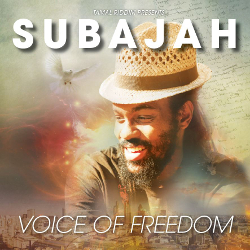Articles about reggae music, reviews, interviews, reports and more...
Subajah - Voice of Freedom

Subajah - Voice of Freedom
The Many Influences of a Reggae Artist
Sampler
If you have ever wondered about the power of an EP to introduce a reggae artist’s style, look no farther than Voice of Freedom by Martinique-born, France-influenced, London-based singer Subajah. At five cuts—three songs and two versions—this EP gives a good sense of the breathy, ethereal, and pleading voice of a fine young, spiritual, multi-cultured singer. After hearing this EP you may wish, as I did, to find other releases by Subajah and learn about a committed reggae artist of an unusually diverse background.
 To get a sense of how good a reggae artist Subajah can be, listen to the2014 EP’s superior cut Free Mindz. This song mixes deeply rebellious poetry, a yearning voice, and a superb mixture of melody over the Tamil Riddim (Tamil is the producer) to create a hugely effective reggae piece, one of the best I have heard in some time. The result is a sublime groove. I found myself easily dancing to the intense words:
To get a sense of how good a reggae artist Subajah can be, listen to the2014 EP’s superior cut Free Mindz. This song mixes deeply rebellious poetry, a yearning voice, and a superb mixture of melody over the Tamil Riddim (Tamil is the producer) to create a hugely effective reggae piece, one of the best I have heard in some time. The result is a sublime groove. I found myself easily dancing to the intense words:
"Dem soon will have fi recognize Haile I and Garvey
Hear dem say dem authorize
Only Jah allows
How can you lend me what’s mine?
Bounded in your shitstem we remain free minds."
It’s a very fine song, (a video of him singing it is available) and the groove is picked up later on the EP with a dub version of the song, one with many sonic surprises to delight the ear.
Two other songs on the EP are fine pieces too. Good Morning is a fine sound, and Subajah’s spirituality comes on you like a reggae fog traveling over the landscape in Voice of Freedom, where the artist explores the continuing source of his spiritual destiny:
"She says, coming from a land of some kind of priestess
Giving me a mission, saying it ain’t just a request
Telling me they chose me to speak to the world with serenity and kindness."
The song, Voice of Freedom, is reggae. But if you close your eyes and open them; you would not be shocked to find yourself in a smoky Montmartre nightclub listening to a reggae chanson. It’s not a surprise to learn that the singer once lived in France. Subajah has stated that, in homage to his homeland, that his musical style is best called Larm Kreole, which means Creole tear. An exploration of his other works reveals a similar multiculturalism. Across the Barriers, from the album Rugar pour L’Afrique (Roar for Africa), a single riddim is a CD based on the Vie’ Zion riddim. His Rev Brile, from the many-artist album Enfants soldats d’ici et l’ailleirs (Child Soldiers Here and There) is sung in French. This is a man of many influences. Even his name comes from Martinique creole slang for “rebel.” Add Jah to that, and you see a Rastafari singer has emerged from a diverse set of experiences.
After the EP showed me a glimpse of Subajah’s abilities, I listened to his 2012 single Runaway and the accompanying Suba Meditation. Both are excellent and both are consistent with the heartfelt cuts on Voice of Freedom. Subajah has also headed a group with I Jah, Barry Dread, and Iya Kneel called Subajah Family. The “family” has worked with English reggae giants Aswad and the brilliant Julian Marley, among others, and are a welcome sight on the London reggae stages.
A very intriguing singer is this man of many cultures, Subajah. A full album would give to the world reggae music of a unique kind. Let’s hope Subajah gets the chance to show us what he can do.
Comments actually desactivated due to too much spams
Browse by categories
Recommended Articles
Latest articles
Recently addedView all
© 2007-2026 United Reggae. All Rights Reserved. Reproduction in whole or in part is prohibited. Read about copyright
Terms of use | About us | Contact us | Authors | Newsletter | A-Z














